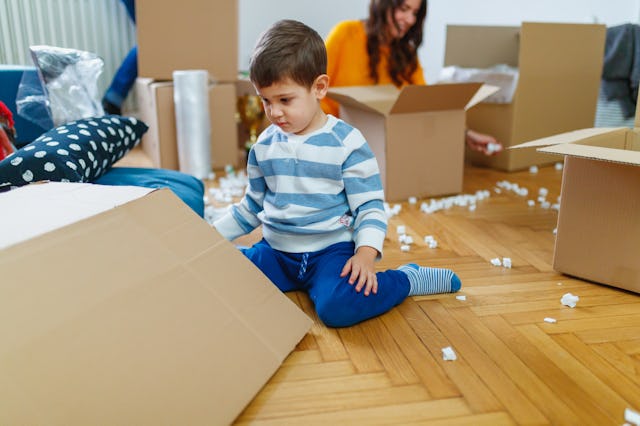Moving A Lot During Childhood Could Increase Risk Of Depression Later In Life
A new study suggests that a ‘settled life’ might be one way to help protect kids’ future mental health.

Parents know that moving at any age can be majorly stressful. Whether you’re worried about packing your life into boxes or making new friends in a new place, it can certainly take a mental toll on both you and your kids. But a new study suggests that kids who move during their childhood may bare some profound effects.
Moving doesn’t have to be the end of the world, of course — however, it’s important to know the potential impact it can have on kids.
A study by the University of Plymouth has found that kids who experience moving multiple times throughout their childhood are more likely to experience depression as they grow up. According to the study, children who move once between the ages of 10 to 15 are 41% more likely to be diagnosed with depression than those who don't move. The risk rises to 61% for kids who move twice or more during those same years.
The study, published in the journal JAMA Psychiatry, followed the locations of over 1 million people born in Denmark between 1981 and 2001 through their adulthood. It found that at least 35,000 of the participants still living in Denmark had since been diagnosed with depression.
Experts have long observed that moving can have a negative impact on little ones. Previous studies have shown that kids who move are more likely to experience adverse health outcomes down the road, and that moving to income-deprived areas can increase the risk of depression by 10%. The new study, however, showed that moving to any new place can impact mental health, regardless of the area’s economic status.
Mental health is complicated, and no one thing can make or break a kid’s future (phew!). But as the study’s lead researcher Clive Sabel explained to Science Daily, moving can affect a number of areas in a kid’s life, having a greater chance of impacting their future mental health.
"We know there are a number of factors which lead to a person being diagnosed with a mental illness,” he said. “However, this is the first evidence to suggest that moving to a new neighborhood during childhood is among them, and we believe the numbers we are seeing could be the tip of the iceberg. During those formative years, children are building their social networks through school, sports groups or other activities. Each time they have to adapt to something new it can be disruptive, so we potentially need to find new ways to help people overcome those challenges.”
The study suggests that the best way to avoid the potential negative impacts of moving is to, well, not move. Researchers say that a “settled life” in terms of location can help kids avoid depression in the long term.
But sometimes, moving can be inevitable. Maybe you’re a military family, or maybe kids are missing out on family members who live far away. Moving can also be a good thing in a number of ways — and that could erase negative effects, too. Engaging kids in conversations about mental health can be a great way to mitigate potential harm, whether you and your family are making a cross-country move, or hopping over to the next school district.
Also, note that all scientific studies have limitation. This is the first study of its kind, and more research needs to be done. It also involved only one country and population in a single span of time.